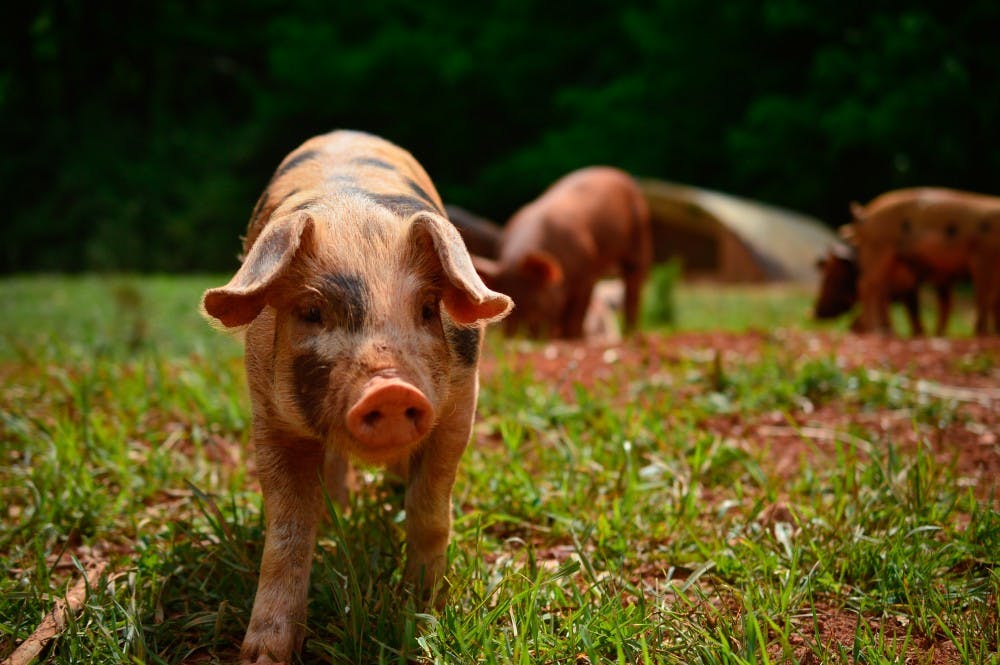Saxapahaw, NC — A group of farmers at the Carrboro Farmers Market felt there was a slight disconnect between their customers and their practices. Together, they decided to create an opportunity for the public to tour their farms, and established the Piedmont Farm Tour 21 years ago.
With help from the Carolina Farm Stewardship Association (CFSA) and Weaver Street Market, the tour has grown, to include more participating farms each year.
“Their customers were coming in and wanted to buy from them at the market, and they thought, ‘Wouldn’t it be a good experience for people to come to our farms and see how we grow our food?’” said Leah Joyner, education coordinator for CFSA.
The farms included on the tour have certain criteria to meet, mostly by being able to articulate that their growing practices are sustainable. Many will use cover cropping, limit their amount of input, use horticulture or have animal welfare practices in place.
Farmers involved will also nominate or invite other farms to the tour.
“The growing practices that they use are often really regenerative, and they’re really good for land and good for consumers,” Joyner said. “That’s what we really value as an organization, working with our group of farmers to really show the outstanding work that they do.”
This year’s tour took place 2-6 p.m. April 23-24 and featured 38 farms in the Piedmont area for $30 a car. Since there are so many tours to choose from, the CFSA recommends going to different clusters to get the most out of the experience.
For example, within the Saxapahaw area it is recommended to visit Turtle Run Farm, Haw River Ranch, Cane Creek Farm and Braeburn Farm.
Joyner also recommends going on tours that suit particular interests.
With a variety of farms, there are many different ways a tour can go. Some are self-guided, where people can roam around the farm and have employees explain the different aspects and answer questions. Others are guided and groups are lead around the farm and shown various growing practices.
Turtle Run Farm, located in Saxapahaw, has been run by Kevin and Kim Meehan since 1996. They have been a part of the tour from the very beginning of the farm’s existence.
“It’s a nice way for people who buy our food to see our process,” Kim Meehan said. “Anyone can come check out and see what we’re doing. It’s a way for people who go to the farmers’ market to see, ‘Hey, I buy this food. This is where it comes from.’”
Kim Meehan leads groups through fields of strawberries, potatoes, carrots and other types seasonal produce that are alternated by planting cover crops in the off-season, such as rye or crimson clover. Though the farm is not certified organic, it follows many sustainable practices.
Turtle Run Farm uses drip irrigation, alternates crops and even creates its own fertilizer. Worms will decompose piles of leaves and compost underneath truck toppers, and Kevin Meehan will ferment a mixture of water and alfalfa that gives off a strong smell and works better than nitrogen-infused artificial fertilizer.
“We till as little as possible and use cover crops as long as possible,” Kim Meehan said. “We don’t spray anything, even organic pesticides. We’re kind of environmentalists, and our kids will eat straight from the garden.”
Though the farm is considered small at eight acres, Kim Meehan said it’s still more than they can keep up with and finding the time to tend it is difficult, especially with children to take care of.
Other farms focused on sustainable animal agriculture, too.
Surrounded by creeks and wooded walking trails are several hundred heritage pigs, goats, sheep, chickens and other domestic animals at Cane Creek Farm. Eliza MacLean owns the farm and believes in raising animals humanely.
“We have Ossabaw Island hogs, which were shipwrecked in the 1600s from the Spanish and they ended up on an island off the coast of Georgia,” said Elizabeth Basnight, a worker on the farm. “Eliza was the first to really commercially breed this kind of pig and that’s what we make all of our prosciutto with, so it’s really authentic.”
The animals and crops are rotated to keep the soil healthy and animals on fresh forage. They are not kept in confinement but are free to graze and roam, which ensures that they are happy and healthy.
MacLean believes that raising animals humanely produces healthy food with incredible flavor. Additionally, it minimizes the need for medication and antibiotics.
Each pig is smart and has its own personality. Though MacLean loves the pigs, she has no issue having them slaughtered and sold at the Left Bank Butcher.
“I have an end game for everyone, and that means everyone gets a crack at a really nice life and they get to be a pig and they’re happy,” MacLean said. “They leave when they’re getting good and of course if they knew they would choose to live a little longer, but it leaves more for me to give them that same sort of experience.”
Other farm clusters exist near Elon, such as those in Mebane and Chapel Hill, that also follow sustainable practices for customers to learn and buy from.
“We’re excited that so many consumers are interested in coming to see the work that these farmers do and learning about locally produced food,” Joyner said.


